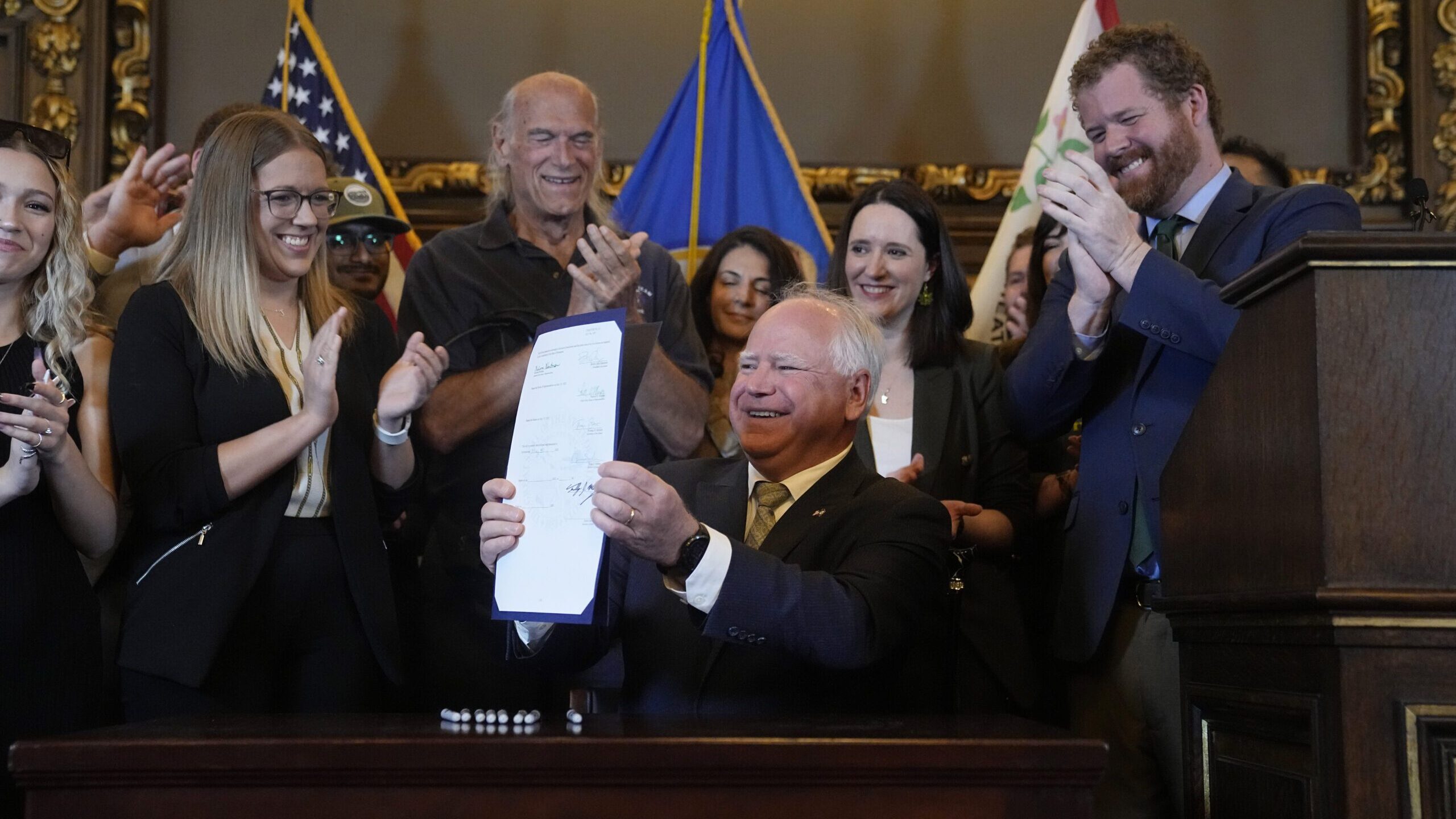Walz signs recreational marijuana bill into law
Possibly the most talked about bill during this year’s legislative session, the recreational marijuana bill, was signed into law on Tuesday.
Joined by state lawmakers and other advocates, including former Gov. Jesse Ventura, Gov. Tim Walz signed the legislation during a ceremony at the State Capitol to make Minnesota the 23rd state to legalize recreational marijuana.
“Jimi Hendrix is looking down on Minnesota smiling today,” Ventura said while pumping his fist.
Ventura proposed legalizing recreational marijuana 25 years ago when running for governor and during his four years as governor. Most viewed his position on the issue as extreme. What changed in 25 years? Ventura says Minnesotans are more educated about cannabis.
“And not listening to and watching performances like Reefer Madness on TV and things of that nature,” Ventura said at a news conference packed with legal marijuana supporters in the Governor’s Reception Room. “The propaganda that went on about cannabis all these years.”

Minnesota Gov. Tim Walz, middle, holds the bill signed to legalize recreational marijuana for people over the age of 21, making Minnesota the 23rd state to do so, Tuesday, May 30, 2023, in St. Paul, Minn. Former Gov. Jesse Ventura stands at center. (AP Photo/Abbie Parr)
The bill made it through 13 committees at the Legislature, as well as numerous hearings and a conference committee before the session ended last week, and was one of the DFL’s biggest priorities going into the year.
RELATED: Celebration over cannabis law prompts warnings, reminders for responsible use
“I’m really proud Minnesota is taking a step forward and trying something new,” said Sen. Lindsey Port, DFL-Burnsville, who authored the bill in the Senate while noting that prohibition never worked.
House bill author Rep. Zack Stephenson, DFL-Coon Rapids, said legalizing recreational marijuana was one of the top issues he heard about during the 2022 campaign. “People would say, ‘It’s time.’ Let’s do this. Our current laws are doing more harm than good.”
Once it takes effect on Aug. 1, the legislation will allow Minnesotans who are 21 and older to have up to 2 ounces of cannabis flower, 8 grams of concentrate and 800 milligrams of edible products, as well as up to two pounds of cannabis flower at a private residence.
Lawmakers agreed on a 10% tax for marijuana products.
The other big part of the legislation is the expungement of past misdemeanor marijuana-related convictions for Minnesotans. However, the Minnesota Bureau of Criminal Apprehension (BCA) estimates it will take until August 2024 to erase all of those convictions.
Because of the complexity of everything in the legislation and the work it will take to set up the new Office of Cannabis Management, certain parts will take some time. Retail marijuana sales aren’t expected to start until 2025 and expungements could take even longer.
Gov. Walz says he’s confident the state will get this right.
“We’ve got 50 years of folks we’ve been arresting and getting records on them; it’s not going to unwind immediately,” Walz said.
“It’s going to take a bit of time to get this up and going,” the governor added. “Getting some people into positions to be able to run this, but I assure Minnesotans a lot of thought has gone into this.”
A spokesperson for the BCA says the agency estimates more than 66,000 previous charges are eligible for expungement and a total of 230,000 felony records are eligible for review by the newly created Cannabis Expungement Board.
The agency plans to work with a vendor over the coming year to develop system changes that will automatically expunge appropriate records. However, the expungements aren’t expected to start for around a year.
“Even though the intention is to provide relief as soon as possible, what we have found in other states across the nation is that automatic doesn’t always mean automatic,” Jana Hrdinová, the administrative director of the Drug Enforcement and Policy Center at The Ohio State University, told 5 EYEWITNESS NEWS.
Hrdinová said Minnesota’s law is more progressive than some other states because the state is handling the expungement process and isn’t requiring people to petition the court to clean their record.
“It’s going to help a lot of people. We know, for better, for worse, that criminal records are used to deny people jobs, housing,” Jon Geffen, director at The Legal Revolution Law Firm, said of the law.
Supporters of the new law remind Minnesotans that driving while impaired by marijuana will still be illegal. The bill also includes $15 million to educate law enforcement on how to spot drivers impaired from marijuana use. No reliable roadside test currently exists.
The Bureau of Alcohol, Tobacco, Firearms, and Explosives (ATF) also noted that marijuana is still not legalized federally, which means Minnesotans still won’t be able to legally ship, transport, receive or have any guns or ammunition if they use marijuana.
“Until marijuana is legalized federally, firearms owners and possessors should be mindful that it remains federally illegal to mix marijuana with firearms and ammunition,” ATF’s Acting Special Agent in Charge Jeff Reed, of the St. Paul Field Division, said. “As regulators of the firearms industry and enforcers of firearms laws, we felt it was important to remind Minnesotans of this distinction as the marijuana laws adjust here in the State of Minnesota.”
The state’s Office of Cannabis Management website is already active and has more information for Minnesotans here.
See the status of all the high-profile bills we’ve followed throughout the session with KSTP’s Legislative Tracker.
[anvplayer video=”5179218″ station=”998122″]